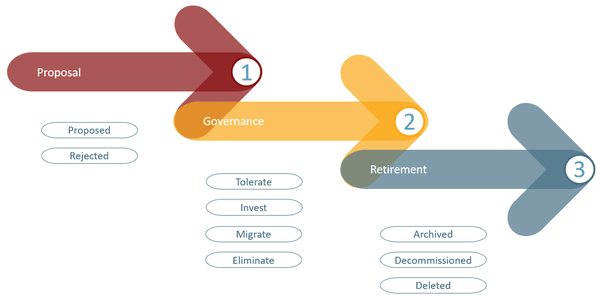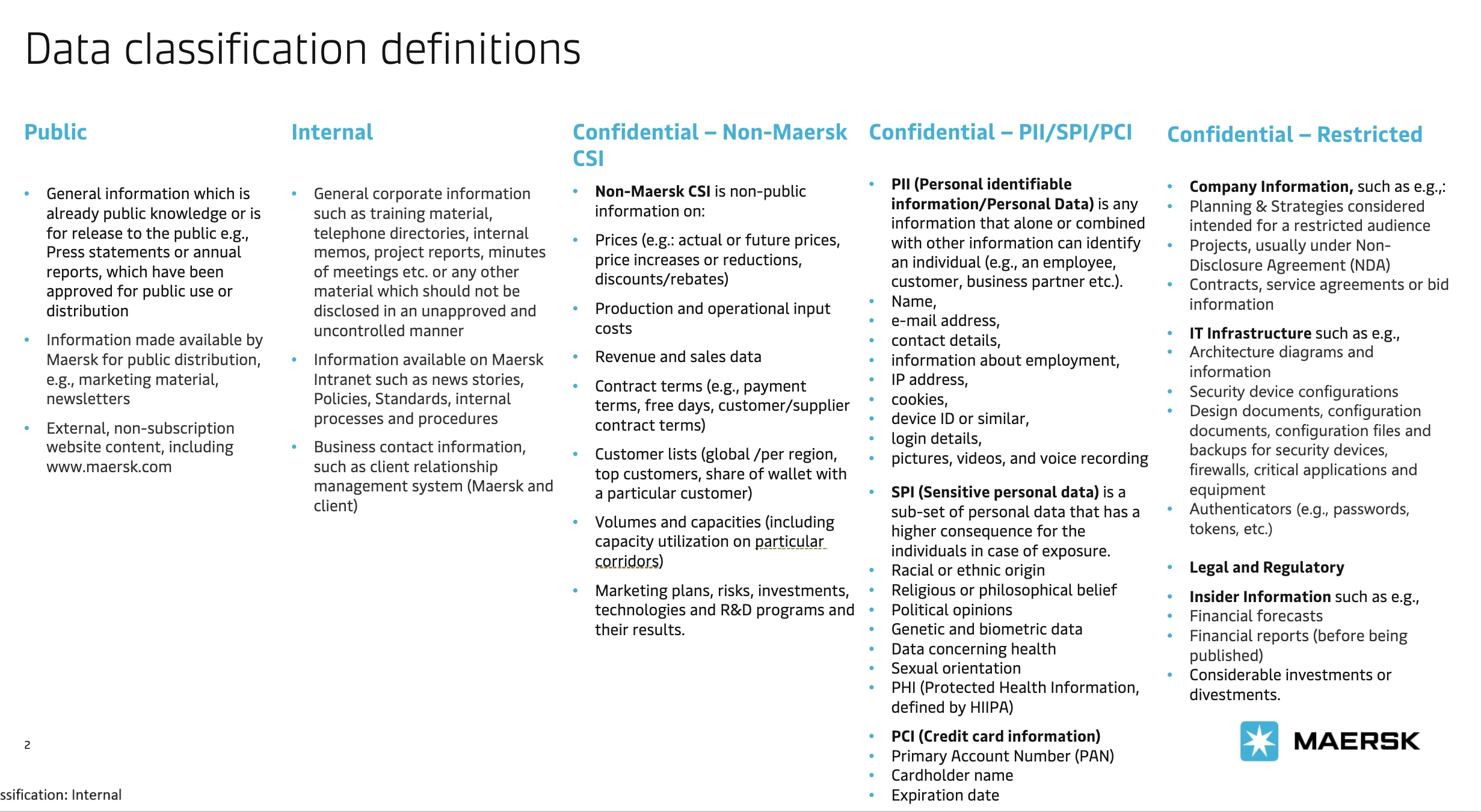Terminology
Application
The MAC acts as the centralized repository for information on all applications within Maersk, ensuring consistency and accuracy of data.
Application Types:
There are four categories of application.
-
Business Application: A business application is a software program or system that facilitates a Maersk Business Unit/Maersk Platform to operate its business, drive business value, and achieve its strategic goals.
-
Data Product: A Data Product represents a product within Global Data and Analytics that uses Maestro and Maersk's data lake to extract and report data for use by business users. In Discussion
-
Technical Application: A technical application is software that facilitates the development, management, or operation of business applications and platforms, ensuring their functionality and efficiency.
-
AI Model An AI model is a mathematical framework or algorithm designed to perform tasks that typically require human intelligence. These tasks can include recognizing patterns, making decisions, translating languages, and more. AI models are trained on large datasets to learn from examples and improve their performance over time. AI Models are typically then used by Business and Technical applications to provide the output and outcomes required. In Discussion
MAC Fields
Name
The application name is a concise, descriptive title that uniquely identifies the application within the organization. It should be clear, memorable, and reflective of the application's purpose or functionality. The name helps users and stakeholders easily recognize and refer to the application.
Description
The application description is a detailed summary that provides an overview of the application's purpose, functionality, and key features. It should explain what the application does, who its intended users are, and how it adds value to the organization. The description may also include information about the application's dependencies, integrations, and any unique aspects that distinguish it from other applications.
Owners
An Application Owner is a key role within an organization responsible for the overall management and oversight of a specific application. This role ensures that the application aligns with the business objectives and operates efficiently.
Status
In the context of maintaining an application catalog for a company, application statuses help track the lifecycle and current state of each application. Here are the definitions for the statuses Active, Inactive, Rejected and Deleted.
- Active: An application with the status "Active" is currently in use and operational within the organization.
- Inactive: An application with the status "Inactive" is not currently in use and is retired within the organization.
- Rejected: An application with the status "Rejected" means the application reporting manager has rejected the application due to data consistency & will be kept for 30 days then it will be Archived.
- Deleted: An application with the status "Deleted" has been permanently removed from the organization's systems and records. In MAC is logic deleted and will be moved to the historical table.
MVC
MVC or Minimum Viable Company is the list of most critical applications needed to run essential business processes. This enables Maersk to prevail during a disaster, such as a cyber-attack or major IT failure. We ensure these applications and their supporting IT systems can be recovered based on a pre-determined recovery sequence.
Platform Name
In the context of maintaining an application catalog for a company, a platform refers to the foundational technology environment that supports the development, deployment, and management of applications.
Target Decommissioning Date
The Target Decommissioning Date refers to the planned date on which an application, system, or piece of equipment is scheduled to be permanently taken out of service. This date is set during the planning phase of the decommissioning process and is used to coordinate the necessary activities to safely and efficiently retire the asset.
MIP (Maersk Integrated Platform) Layer
The Maersk Integrated platform (MIP) is a natural evolution from our previous Target Architecture Frameworks and represents both an architecture framework as well as a collection of underlying technology capabilities that together enable a cohesive and consistent experience for our software engineers.
Locally Managed
The Locally Managed flag for an application indicates whether the application is maintained and operated on a specific team's local infrastructure rather than a centralized or cloud-based environment.
Decommissioned Date
The decommissioned date refers to the specific date on which an application, system, or piece of equipment is officially taken out of service and is no longer in use within the organization. This date marks the end of the application's lifecycle and indicates that it has been retired from active operation.
Strategic Intent
Strategic Intent refers to the long-term purpose and direction of an application, system, or platform within an organization. It helps guide decision-making regarding resource allocation, future investments, and lifecycle management.

Go to Information Classification
Information Classification
Information Classification is a process used to categorize data based on its level of sensitivity and the impact on the organization if that data is disclosed, altered, or destroyed without authorization.
- Public: Public information can be viewed by anyone inside or outside of Maersk. However, the decision to classify information as public must be in consideration of Maersk’s external communication strategy and branding guidelines.
- Internal: Internal information is intended for use within Maersk and can be accessed without restrictions by Maersk employees, contractors and third parties with a need to know and who have signed confidentiality/non-disclosure agreements. Unauthorized disclosure could cause minor impact or embarrassment to Maersk or its customers, suppliers, business partners, or employees, causing localized negative publicity or embarrassment
- Confidential: Confidential information is the most valuable information within Maersk and it requires the highest level of protection. Confidential information may only be accessed by a restricted internal audience or external parties with a need to know reason who have signed a Confidentiality Statement/Non-disclosure agreement. Unauthorized disclosure of confidential information could adversely impact Maersk, its customers, suppliers, business partners and employees and could result in the loss of competitive edge, regulatory breach, international negative publicity, or impede operations.

Production Deployed
A flag indicating whether the application is already deployed in production when creating/onboarding the application in MAC.
Demo Test or Exploration
A flag indicating whether the application is a POC, Test or Exploration application registered in MAC.